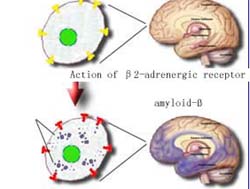
After many years research, CAS scientists recently identified a new pathway underlying the Alzheimer's disease. They discovered that activation of a protein called β2-adrenergic receptor may lead to the abnormal formation of the amyloid plaques, which are believed to be the hallmark and primary cause of the disease. Their work was reported by
Nature Medicine online on Nov. 19.
Alzheimer's disease, named after the German psychiatrist Alois Alzheimer (1864-1915) who made its first description one hundred years ago, is a neurodegenerative disorder that impairs memory, cognition, and behavior. It has become the most frequent neurodegenerative senile dementia, currently affecting more than 20 million people across the world and several millions in China. The number is expected to increase as a result of the rapid aging of human population.
Previous studies have shown that amyloid-β (Aβ), the fragment of a protein that is snipped from another protein called amyloid precursor protein (APP), is a major component of amyloid plaques. In a healthy brain, these protein fragments would be broken down and maintained at low levels. In Alzheimer's disease, unfortunately, the fragments are abnormally produced and accumulate to form hard, insoluble plaques, which are the characteristic lesions found in Alzheimer's patients and could dramatically inhibit several genes critical to memory and learning.
Thanks to many years of hard work, a research team led by PEI Gang from the Institute of Biochemistry and Cell Biology, the CAS Shanghai Institutes for Biological Sciences, discovered that the β2 adrenergic receptor (β2-AR), a member of the G-protein-coupled receptor superfamily, could enhance Aβ production by stimulating the activity of γ-secretase. Furthermore, in vivo experiments with an Alzheimer disease mouse model showed that cerebral amyloid plaque formation was increased after chronic treatment with β2-AR agonists. In contrast, amyloid plaque formation was reduced after chronic treatment with a β2-AR antagonist. Thus, these findings provide evidence implying that β2-AR antagonists could be potential drugs for the treatment of Alzheimer's disease.
The study also helps to explain the question why the environment could be a risk factor for the disease. As the β2-AR, a very important protein in specialized regions of the cell membrane, is responsible for the signal receipt and transmission of cells, according to NI Yangxiang, lead author of the Nature Medicine article, its activation by environmental factors such as stress could lead to the formation of amyloid plaques and thus the Alzheimer's disease.







